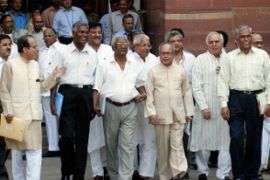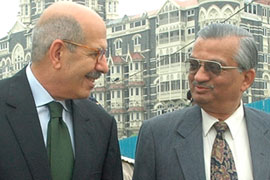India crisis talks on nuclear deal
Government and its communist allies agree to meet again to iron out differences.

The meeting signals that the communists, whose parliamentary support keeps the ruling coalition in power, would not – for now – withdraw their support for the government
Lalu Prasad Yadav, the raliways minister, said: “We will not let the government fall.”
 |
| IAEA says ElBaradei’s, left, visit is routine, but timing of the visit added to the tension [AFP] |
The communists insist the nuclear deal would make India subservient to US interests, but the government seems determined to seal the accord, potentially its biggest foreign policy achievement.
The deal would be a milestone in India-US relations.
It would allow India to import US nuclear fuel and reactors, despite having tested nuclear weapons and not signed the Non-Proliferation Treaty.
It has been criticised by many outside India, including by some members of the US congress, who say the deal unfairly rewards India and undercuts a US-led campaign to curtail nuclear ambitions of nations like Iran.
Uday Bhaskar, a Delhi-based defence analyst, told Al Jazeera: “There was a determination India needs to be brought into the global loop of nuclear commerce, which it is not allowed to enter now.”
“There is a net gain for the international community and a net gain for India.”
Sonia Gandhi, the ruling Congress party’s chief, met communist leaders on Monday night and said the government wanted to start negotiations with the IAEA.
Media reports said the communists rejected that, heightening speculation that Tuesday’s panel meeting could see the government and the communists parting ways.
ElBaradei’s visit
The growing crisis came just as Mohamed ElBaradei, director-general of the IAEA, arrived in India on a three-day visit to speak at an energy conference, visit a nuclear research facility in Mumbai and meet Indian nuclear officials.
While the IAEA says his visit is not political, the timing added to tension between the government and the deal’s opponents.
The Congress party has already started preparing for early elections, shuffling party leaders and announcing populist welfare measures to woo poor voters.
After negotiating with the IAEA, India must get clearance from the 45-nation Nuclear Suppliers Group (NSG) that controls global civilian nuclear commerce.
Then the deal goes back to the US congress for a final approval.